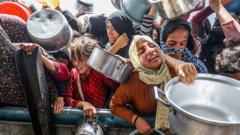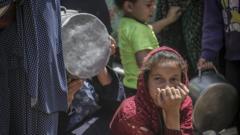With the WFP declaring an end to food aid in Gaza, the plight of 2.1 million Palestinians intensifies amid severe shortages.
**UN World Food Programme Halts Food Aid in Gaza Amid Ongoing Blockade**

**UN World Food Programme Halts Food Aid in Gaza Amid Ongoing Blockade**
The UN agency warns of a humanitarian crisis as food supplies run out following Israel's blockade.
The World Food Programme (WFP) announced today it has completely exhausted its food stocks in Gaza, where Israeli authorities have maintained a blockade on humanitarian aid for seven weeks. The WFP delivered its final supplies to hot meal kitchens on Friday, which are expected to deplete their remaining resources shortly.
The blockade began on March 2, escalating after the collapse of a two-month ceasefire, as Israel intensified its military operations in a bid to pressure Hamas into releasing hostages. The UN asserts that international law mandates Israel to facilitate aid for the 2.1 million residents of Gaza, a claim Israel contests, stating that it is upholding legal obligations and denying any aid shortages exist.
By the end of March, all bakeries supported by the WFP, a total of 25, shut their doors due to lack of wheat flour and cooking fuel. Distribution of food parcels for families—intended to last two weeks—has also been exhausted.
The UN's Office for the Coordination of Humanitarian Affairs (OCHA) reported that in addition to food shortages, there are critical deficits in medicine and medical supplies for overwhelmed hospitals treating casualties sustained from Israeli airstrikes. Fuel scarcities further inhibit water supply and distribution.
The prolonged blockade, a historical record for Gaza, has devastated already fragile food markets, causing food prices to surge by 1,400% relative to the previous ceasefire period. The dire necessity for essential goods has compounded issues of nutrition for vulnerable demographics including children, pregnant and new mothers, and the elderly.
Despite limited access, hot meal kitchens are serving as a vital resource, reaching only half of the population and covering merely 25% of daily nutritional requirements. "The situation inside the Gaza Strip has reached a breaking point: people are running out of coping mechanisms, and the fragile improvements during the ceasefire have deteriorated," the WFP stated, urging immediate action to restore aid flows and comply with international humanitarian standards.
The agency highlighted that over 116,000 tonnes of food assistance, adequate to support one million individuals for four months, is currently ready for dispatch if Israel reopens access to the Gaza border.
In response to international outcry from countries like the UK, France, and Germany—who jointly criticized the blockade—the Israeli foreign ministry maintained that they have allowed substantial aid during the ceasefire while accusing Hamas of commandeering supplies for military purposes. Hamas has uniformly refuted these allegations, and the UN maintains its oversight of aid delivery has been effective thus far.
Recent developments saw Hamas reject an Israeli ceasefire proposal that required disarmament in exchange for a six-week cessation of hostilities alongside the release of some hostages. The organization reiterated its stance that it would only exchange all remaining hostages for a complete withdrawal of Israeli forces.
The Israeli military initiated this conflict following a cross-border assault on October 7, 2023, which resulted in the deaths of around 1,200 individuals and the abduction of 251 others. The situation in Gaza has become increasingly severe, with the Hamas-run health ministry reporting over 51,439 fatalities in the territory since the commencement of hostilities.
The blockade began on March 2, escalating after the collapse of a two-month ceasefire, as Israel intensified its military operations in a bid to pressure Hamas into releasing hostages. The UN asserts that international law mandates Israel to facilitate aid for the 2.1 million residents of Gaza, a claim Israel contests, stating that it is upholding legal obligations and denying any aid shortages exist.
By the end of March, all bakeries supported by the WFP, a total of 25, shut their doors due to lack of wheat flour and cooking fuel. Distribution of food parcels for families—intended to last two weeks—has also been exhausted.
The UN's Office for the Coordination of Humanitarian Affairs (OCHA) reported that in addition to food shortages, there are critical deficits in medicine and medical supplies for overwhelmed hospitals treating casualties sustained from Israeli airstrikes. Fuel scarcities further inhibit water supply and distribution.
The prolonged blockade, a historical record for Gaza, has devastated already fragile food markets, causing food prices to surge by 1,400% relative to the previous ceasefire period. The dire necessity for essential goods has compounded issues of nutrition for vulnerable demographics including children, pregnant and new mothers, and the elderly.
Despite limited access, hot meal kitchens are serving as a vital resource, reaching only half of the population and covering merely 25% of daily nutritional requirements. "The situation inside the Gaza Strip has reached a breaking point: people are running out of coping mechanisms, and the fragile improvements during the ceasefire have deteriorated," the WFP stated, urging immediate action to restore aid flows and comply with international humanitarian standards.
The agency highlighted that over 116,000 tonnes of food assistance, adequate to support one million individuals for four months, is currently ready for dispatch if Israel reopens access to the Gaza border.
In response to international outcry from countries like the UK, France, and Germany—who jointly criticized the blockade—the Israeli foreign ministry maintained that they have allowed substantial aid during the ceasefire while accusing Hamas of commandeering supplies for military purposes. Hamas has uniformly refuted these allegations, and the UN maintains its oversight of aid delivery has been effective thus far.
Recent developments saw Hamas reject an Israeli ceasefire proposal that required disarmament in exchange for a six-week cessation of hostilities alongside the release of some hostages. The organization reiterated its stance that it would only exchange all remaining hostages for a complete withdrawal of Israeli forces.
The Israeli military initiated this conflict following a cross-border assault on October 7, 2023, which resulted in the deaths of around 1,200 individuals and the abduction of 251 others. The situation in Gaza has become increasingly severe, with the Hamas-run health ministry reporting over 51,439 fatalities in the territory since the commencement of hostilities.





















